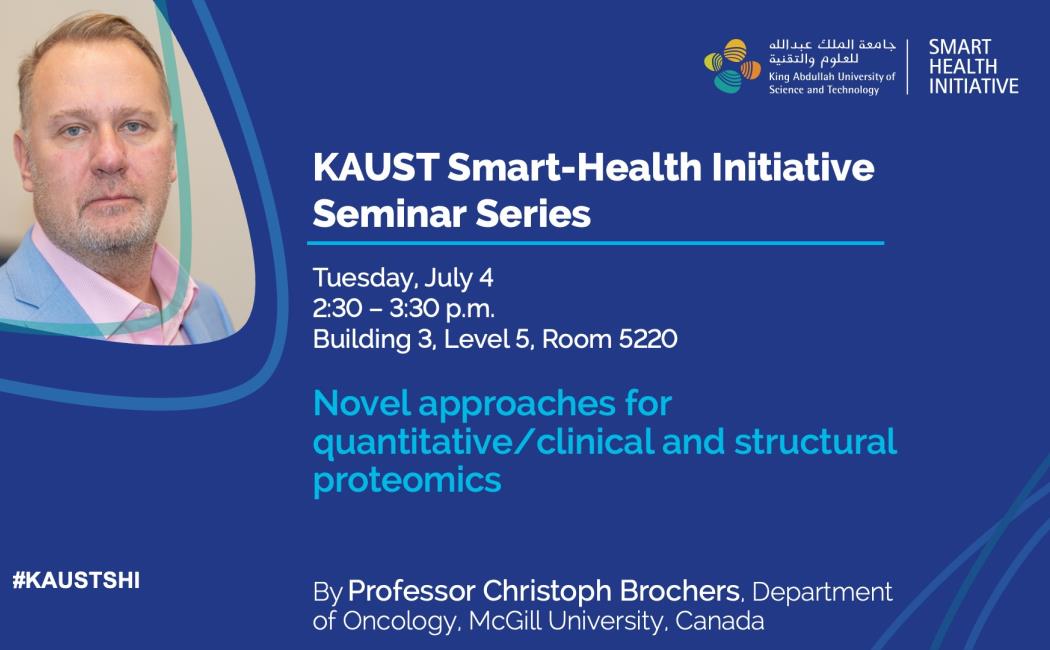
BESE Invited Seminar: Novel approaches for quantitative/clinical and structural proteomics
Zoom link: https://kaust.zoom.us/j/95568052484
Presenter:
Prof. Christoph Brochers, Department of Oncology, McGill University, Canada
Abstract:
The accurate and rapid determination of protein concentrations using multiplexed multiple reaction monitoring (MRM) with isotope-labeled internal standards has the potential to revolutionize biochemistry and medical sciences. The combination of an Evosep One LC with an Agilent QQQ6495C allows a several-fold reduction of analysis time while maintaining high multiplexicity. As an example, we show the use of a multi-protein method for the absolute quantitation of 270 proteins, combined with metabolomics and Artificial Intelligence (AI), to analyze the plasma of a COVID cohort for prediction of survival. Using samples collected on the day of admission to the ICU, a panel of 10 proteins and 5 metabolites was able to predict survival with 92% accuracy. Moreover, optimization of the Evosep/6495C combination allowed adaptation of the 270-protein MRM method to a 24-minute gradient, thus doubling the throughput compared to before.
If additional sensitivity were to be needed for a specific application, immuno-affinity enrichment of targeted peptides can be combined with MRM. We have used this immunoMRM (iMRM) approach for the quantitation of proteins in the immuno-checkpoint pathway, including PD-L1. Currently, PD-L1 expression levels, as determined by immunohistochemistry (IHC), serve as biomarkers for many checkpoint-inhibitor (CPI) therapies and are used to determine the eligibility of subjects for immunotherapy. However, 30-50% of subjects in a PD-L1-positive cohort do not respond to anti-PD-L1 treatment, while some subjects with low or undetectable PD-L1 levels have significantly improved survival with CPI. We have found that IHC-based PD-L1 levels only moderately correlate with PD-L1 iMRM quantification, and that other PD-L1 axis proteins -- including PD-L2, LCK, and ZAP70 -- are good candidates for biomarkers in non-small cell lung cancer.
In addition to quantitative/clinical proteomics the Borchers lab is interested in developing and applying novel structural proteomics which is a combination of protein chemistry methods and mass spectrometry including limited proteolysis, Hydrogen/Deuterium Exchange, differential protein modification, photoaffinity labeling and crosslinking. These approaches are being applied to determine protein-protein and protein-drug interaction, and conformational changes in proteins to elucidate biological processes.
About the speaker:
Dr. Christoph Borchers is recognized as a pioneer and leading figure in the development of mass spectrometry-based methods for protein quantification using Multiple Reaction Monitoring (MRM) and structural proteomics. He has published more than 345 peer-reviewed papers which are >27,000 times cited (h-factor 79) and is the founder and director of the McGill-Lady Davis Institute Integrated Proteomics Program at the Jewish General Hospital, McGill University, where he is currently a Full Professor in the Department of Oncology.
Dr. Borchers received his PhD degree from the University of Konstanz, Germany in 1996. After his post-doctoral training at the NIEHS/NIH/RTP, NC he became the director of the UNC-Duke Proteomics Facility and held a faculty position at the UNC Medical School in Chapel Hill, NC (2001-2006). From 2006 to 2019, he was a Professor in the Department of Biochemistry & Microbiology, and Director of the Genome BC Proteomics Centre at the University of Victoria, BC, Canada, where he held the Rix BC Leadership Chair in Biomedical and Environmental Proteomics.
Dr. Borchers was also involved in promoting proteomics research and education through his involvement with HUPO (International Council Member), the British Columbia Proteomics Network (Executive Committee Member, past Scientific Director) and the Canadian National Proteomics Network (Member, past VP External, President and Chair of the Board of Directors). He is also a Fellow of the Canadian Academy of Health Sciences.
Host: Professor Łukasz Jaremko
